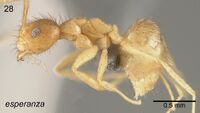Nylanderia esperanza
| Nylanderia esperanza | |
|---|---|

| |
| Scientific classification | |
| Kingdom: | Animalia |
| Phylum: | Arthropoda |
| Class: | Insecta |
| Order: | Hymenoptera |
| Family: | Formicidae |
| Subfamily: | Formicinae |
| Tribe: | Lasiini |
| Genus: | Nylanderia |
| Species: | N. esperanza |
| Binomial name | |
| Nylanderia esperanza LaPolla & Kallal, 2019 | |
This species has been collected from leaf-litter and sifted soil
Identification
LaPolla and Kallal (2019) - Brownish-yellow to yellow with distinctly darker brownish-yellow to brown macrosetae; propodeal dorsal face anteriorly flat not rounded or higher than mesonotum.
Compare with: Nylanderia guatemalensis
This species is most likely to be confused with N. guatemalensis. In fact, for some time, we considered it as variation within N. guatemalensis. But upon closer inspection there are two relatively easy ways to distinguish the two species from each other. The propodeal dorsal face of N. esperanza is distinctly flat not rounded or higher than the mesonotum as is seen in N. guatemalensis. Additionally, N. esperanza possesses macrosetae on the pronotum that are both abundant and distinctly of varying heights. In N. guatemalensis, the macrosetae are neither as abundant nor of such distinctly varying heights.
Keys including this Species
Distribution
Distribution based on Regional Taxon Lists
Neotropical Region: Dominican Republic (type locality).
Distribution based on AntMaps
Distribution based on AntWeb specimens
Check data from AntWeb
Countries Occupied
| Number of countries occupied by this species based on AntWiki Regional Taxon Lists. In general, fewer countries occupied indicates a narrower range, while more countries indicates a more widespread species. |

|
Estimated Abundance
| Relative abundance based on number of AntMaps records per species (this species within the purple bar). Fewer records (to the left) indicates a less abundant/encountered species while more records (to the right) indicates more abundant/encountered species. |

|
Biology
Castes
Nomenclature
The following information is derived from Barry Bolton's Online Catalogue of the Ants of the World.
- esperanza. Nylanderia esperanza LaPolla & Kallal, 2019: 417, figs. 28-30 (w.) DOMINICAN REPUBLIC.
Unless otherwise noted the text for the remainder of this section is reported from the publication that includes the original description.
Description
Worker
(n=4): TL 2.30–2.70; HW: 0.51–0.61; HL: 0.59–0.75; EL: 0.13–0.15; SL: 0.67– 0.76; WL: 0.74–0.88; GL: 0.85–1.04; SMC: 20–29; PMC: 5–6; MMC: 3–4. indices: CI: 81–90; REL: 20–24; SI: 124–137; SI2: 18–21.
Head: sides of head in full face view nearly parallel; posterolateral corners rounded; posterior margin straight and slightly emarginate medially; anterior clypeal margin relatively convex; ocelli absent; eye well-developed. Mesosoma: in lateral view, pronotum subangular; anterior margin of mesonotum more or less even with posterior pronotal margin; metanotal area with a short flat area before spiracle; dorsal face of propodeum relatively flat and short immediately posterior to metanotal area; dorsal face of propodeum shorter than declivitous face. Color and pilosity: body brownish-yellow; head and gaster sometimes slightly darker yellow; macrosetae on head, mesosoma and gaster distinctly darker brownish-yellow to brown contrasting with body; macrosetae on scapes yellow to white; macrosetae on pronotum abundant and of varying heights; cephalic pubescence sparse; mesosoma with pubescence dorsally on pronotum, mesonotum and anterior portion of propodeum, gastral tergites I & II with dense pubescence.
Type Material
Holotype worker, DOMINICAN REPUBLIC: Parque Nacional del Este nr. Boca de Yuma, 18° 21.872’N, 68° 37.077’ W, elev. 8 m, sifted soil under rocks, 02.viii.2009, J.S. LaPolla & S.A. Schneider (National Museum of Natural History), 2 paratype workers same locality data as holotype (specimens are from the same nest as holotype). 3 paratype workers, DOMINICAN REPUBLIC: Parque Nacional del Este, N 18° 19.884, W 68° 48.693’, elev. 36m, from sifted litter, 30 March 2004, L.R. Davis (300304-14) (NMNH & Museum of Comparative Zoology).
Etymology
Species epithet is a Spanish given name (noun) meaning hope.
Determination Clarifications
This species was also included within the phylogeny of Gotzek et. al (2012) (listed as Nylanderia n.sp. DR3), where it is nested well within a clade of West Indian Nylanderia and sister to a clade of Nylanderia bibadia + Nylanderia metacista. More recent unpublished phylogenomics data suggests this species is the sister to Nylanderia caerula.
References
- LaPolla, J.S., Kallal, R.J. 2019. Nylanderia of the World Part III: Nylanderia in the West Indies. Zootaxa 4658 (3): 401–451 (doi:10.11646/zootaxa.4658.3.1).
- Williams, J.L., Zhang, Y.M., LaPolla, J.S., Schultz, T.R., Lucky, A. 2022. Phylogenetic delimitation of morphologically cryptic species in globetrotting Nylanderia (Hymenoptera: Formicidae) species complexes. Insect Systematics and Diversity 6 (1): 10:1-15 (doi:10.1093/isd/iaxb027).
- Williams, J.L., Zhang, Y.M., Lloyd, M.W., LaPolla, J.S., Schultz, T.R., Lucky, A. 2020. Global domination by crazy ants: phylogenomics reveals biogeographical history and invasive species relationships in the genus Nylanderia (Hymenoptera: Formicidae). Systematic Entomology 45, 730–744 (doi:10.1111/syen.12423).
References based on Global Ant Biodiversity Informatics
- LaPolla J. S., and R. J. Kallal. 2019. Nylanderia of the World Part III: Nylanderia in the West Indies. Zootaxa 4658: 401-451.

